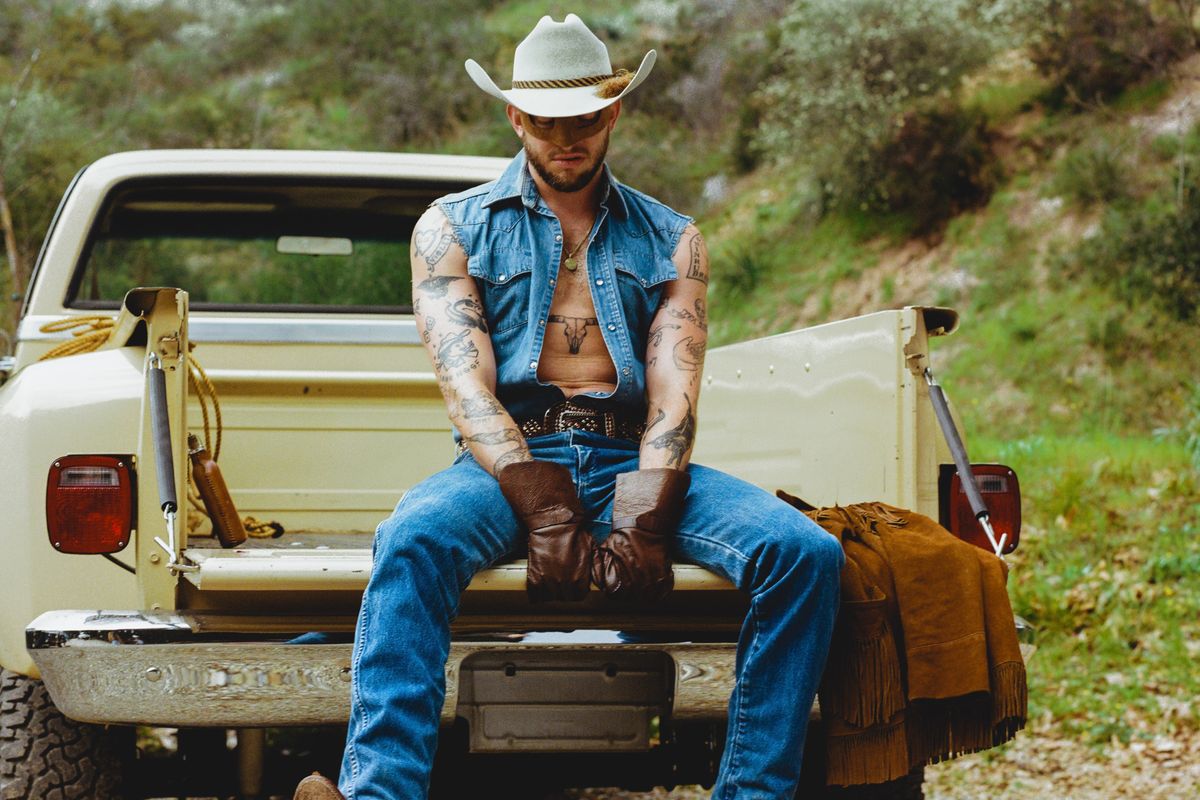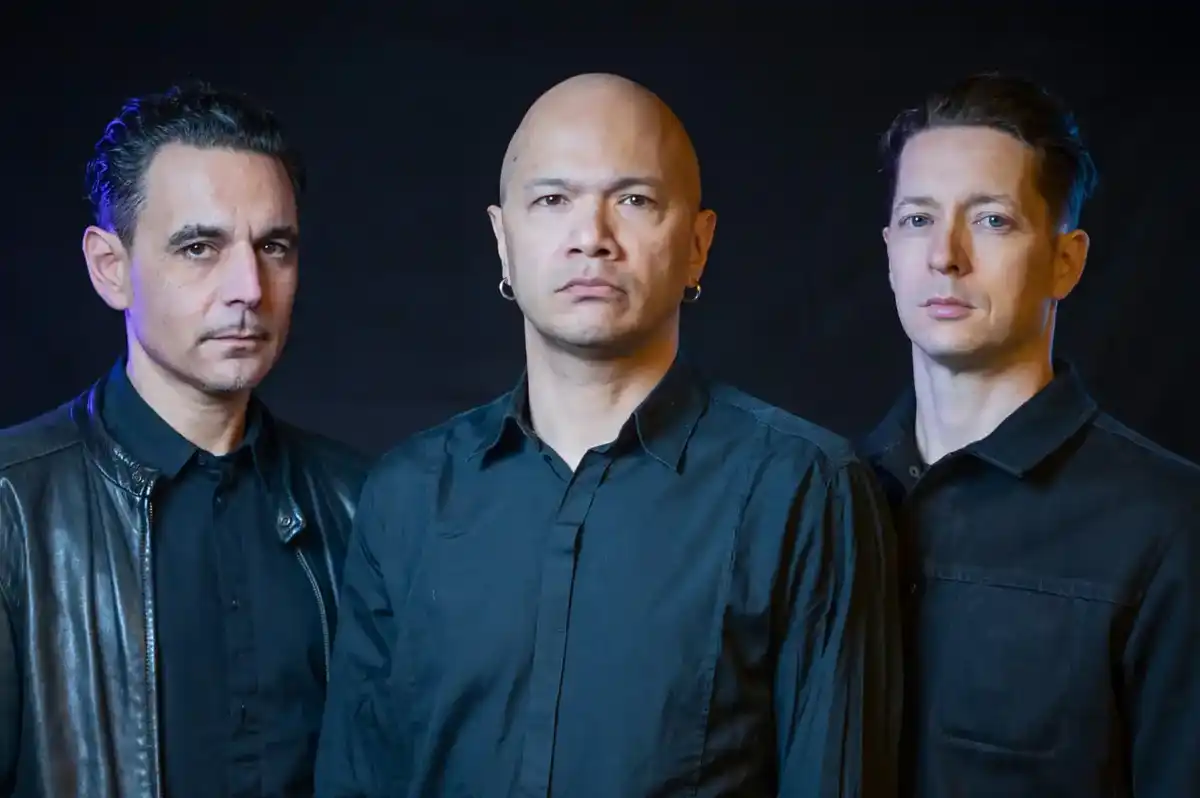Interview: Orville Peck Says 'Country Fans Are Not Given Enough Credit For How Open-Minded They Are'
With the new album, Stampede, the masked star has an a-list group of duet partners from Willie Nelson to Noah Cyrus, but he says that because of his sexual identity some people still won't accept him as a country singer. He has a theory why.

Orville Peck is back on the road. The masked country singer cancelled his tour last summer to focus on his physical and mental health, but now he's back at bigger stages then ever. His live return comes just in time for Stampede, his newly released third album and first on Warner, that features duets with legends like Willie Nelson, Elton John, Beck and major artists like Noah Cyrus, Margo Price and Teddy Swims. Listen here.
"I was off the road for almost a calendar year," the L.A.-based Canadian-South African musician tells Billboard Canada over Zoom from Edmonton where he's on his way to Calgary for, fittingly, the Stampede. "[That was] the longest I've been away from touring my whole life and I've been touring almost 20 years. I was able to, for the first time really ever, take actual time for myself to figure out the parts of me that are not anything to do [with] making music and my career and show business – all of the stuff that I'd sort of just put on the back burner my whole life."
Returning has brought him a new clarity on his place in the changing country music scene. He's still somewhat bemused about how quickly he's risen, but he's used his growing platform to push at the barriers of the genre. Stampede features ripe-for-discovery artists like Montreal's Allison Russell and Mickey Guyton, plus covers of queer country songs like the Magnetic Fields' "Papa Was a Rodeo," Ned Sublette's "Cowboys Are Frequently Secretly Fond of Each Other" and an all-star version of "Rhinestone Cowboy" with TJ Osborne, Waylon Payne and Fancy Hagood – like Peck, all out-gay country singers.
Though more listeners are using the genre for political culture wars, country fans are more open-minded than they get credit for, Orville Peck argues.
Read on for our full Q&A with Orville Peck.
I saw you play at the Monarch Tavern in Toronto in 2019, early on in your career as Orville Peck. The capacity was only about 200...
If that!
And you were back recently playing Budweiser Stage, which has a capacity of 16,000. How has it been adapting to those bigger and bigger stages?
I think especially that first year, the gradient was so steep because we played the Monarch Tavern and then before the end of that year we were headlining the Danforth Music Hall. Then, the next time we came back we were doing two nights sold out at Massey Hall, and then now we come back and we're doing the Bud Stage. Coming up DIY and playing small, sh---y venues to no one, I'm very grateful to have done it that way. It's instilled and built a real gratitude for what I do. Sitting in a broom closet waiting to go on to perform for five people at a dive bar, there's nothing that'll question your love of what you do more than that.
Also, it's built such a beautiful connection with my fan base. People always talk about how amazing our crowds are – and they are. I think it's because there is a mutual respect and a connection that has been built over many years. They get to be on this journey too.
And now you're singing duets with Willie Nelson. How did that come about? Is it true he was the one who asked you?
He invited me onto his tour bus at a festival that we were both playing to meet him, which is a big honour. We were sitting and having coffee and chatting. Well, he was chatting. I was starstruck. I didn't know what to say. And then he said, 'I heard you do a cover of [a] Ned Sublette song, ["Cowboys Are Frequently Secretly Fond of Each Other"].' I said, 'yeah, I cover it in my show sometimes.' He said, 'I think we should redo it as a duet because it's more important now than ever.' And so that kind of started the whole idea of Stampede. I think anyone with any humility probably walks through this life with a healthy dose of imposter syndrome, and I had that for a very, very long time. And so this is incredibly encouraging, validating.
You've talked about the Nashville music industry and how it's both very powerful and still siloed, from the labels to country radio. As you're moving more into those spaces from your more punk-influenced background [playing in Vancouver-area punk bands before starting the Orville Peck project in Toronto], do you still find there's a barrier for them to embrace an artist like you who is coming at it from a different perspective?
It's getting a little bit better, but it's definitely a barrier. I keep joking, after doing a song with Willie Nelson, people still want to say what I do isn't country music. Message received loud and clear. People have a problem with something other than my music, and I think we all know what it is.
It's the same problem that people might have with Beyoncé making a country album, because a lot of people believe that country should be one thing and we all know what that one thing is.
It's really difficult sometimes. At the same time, I have gained tons and tons of fans over the years who are true blue country people. They're probably not connecting to the queerness, they're not connecting to the weird artistry, they're connecting to the fact that I make country music. So I think country fans are not given enough credit for how open-minded they are. I think Nashville is too afraid to see that. I think they're sort of starting to see it.
You just brought up Beyoncé's Cowboy Carter. That album shows the Black roots of country that were always there, and it feels like you're doing something similar with some of the queer country songs that you chose to cover. Are you also looking to show that country music is a broader or more diverse genre than people tend to think?
I think the fact of the matter is that country music has already always been all of these different things. If you historically look at the origins of a lot of the instruments in country, the inspirations from African instruments, Hawaiian instruments, the inspiration taken from gospel and slave songs, there's so much history that is just swept over.
Especially after 9-11, there are some people who think country is about patriotism, specifically American patriotism, being white and heteronormative and living in the South. And the funny thing is, in the kind of country I love, I don't remember those things coming up very much. I don't remember the old school country being so limiting. It had more balls than that. It was adventurous and creative and diverse.
A certain amount of people in America are afraid to embrace anything that's different at the moment. It seems to be getting worse and worse. I think they're holding onto these last bastions of what they believe is this sort of homogenized, acceptable culture, and country music is one of them that they're kind of grasping onto. And it's so bizarre to me because I just don't see what a genre of music could have to do with your political identity. I just don't understand it.
Last year especially, there were a number of country songs that were at the top of the charts that felt like the centre of a culture war, and they ignited these political debates.
It started with Toby Keith, whatever that f--ing sh-t song was called, and then it's carried on throughout country. You see it in "Try That In a Small Town." And the funny thing is, is like, none of these songs are any good. Even if we just take away the ideals and the lyricism, they're not country and they're not good.
At the same time where the genre is being held up as one thing, there are also artists are coming at it and transforming it. There are a lot of artists, like Post Malone, who are having a lot of success right now crossing over into country. And the No. 1 song in Canada right now is by Shaboozey, a country song that quotes a hip-hop song from the early 2000s. Is that what you mean when you say things are starting to change?
Of course Shaboozey’s awesome, and there's all these Black artists that Beyoncé helped to illuminate, but we've had Charley Crockett forever. We've had Mickey Guyton [featured on the Stampede song "Where Are We Now?"] who is an incredible trailblazer for Black women in country music. That's why I wanted to highlight the other out gay men on the last track on my album, which is a cover of "Rhinestone Cowboy." I think I often get labeled as the kind of gay country singer, but there's more of us. I'm not the first and I won't be the last.

















